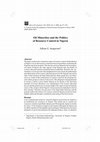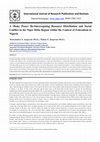Papers by Edlyne E Anugwom
Journal of Political & Military Sociology, 2019

DOAJ (DOAJ: Directory of Open Access Journals), 2011
This contribution examines the role of occult imaginations in the struggle against perceived soci... more This contribution examines the role of occult imaginations in the struggle against perceived socioeconomic marginalization by youth militias from the Ijaw ethnic group in the oil-rich Niger Delta region of Nigeria. It argues that the asymmetric power between the federal government/transnational oil corporations (TNOCs) and the militias may have privileged the invocation of the supernatural as a critical agency of strength and courage by the youth militias. The conflict in the region embodies a cultural revision which has been necessitated by both the uncertainty of the oil environment and the prevailing narratives of social injustice. Hence the Egbesu deity, seen historically as embodying justice, has been reinvented by the youth militias and imbued with the powers of invincibility and justice in the conflict with the government and oil companies. The low intensity of the conflict has limited both the extent of operations and scale of force used by the military task force in the area and thus reinforced the perception of invincibility of the militias attributed to the Egbesu.
Africa Spectrum, Jan 31, 2018
Review of the monograph: Francis B. Nyamnjoh, Drinking from the Cosmic Gourd: How Amos Tutuola Ca... more Review of the monograph: Francis B. Nyamnjoh, Drinking from the Cosmic Gourd: How Amos Tutuola Can Change Our Minds , Bamenda: Langaa RPCIG, 2017, ISBN 9956764655 (soft cover), 310 pp.

Journal of Social Development in Africa, 2000
This paper examines the issue of ethnic conl1icts and thcir implications for democracy in Nigeria... more This paper examines the issue of ethnic conl1icts and thcir implications for democracy in Nigeria. Ethnic conflict and distrust is identified as the bane of former democratic experiments in Nigeria. Moreover, since the late 1980s, ethnicity in Nigeria has assumed disturbing new dimensions. The most crucial of these arc the issues of marginalisation and agitations by ethnic minorities. Marginalisation breeds suspicion, distrust, heightens ethnic tensions and may eventually lead to conl1ict over the sharing and allocation of power and national resources. Democratic tradition, which is imperative lor development, cannot blossom in the context of ethnic conflict. Thus,marginalisation, whether apparent or real, has the potential for disrupting the drive towards democracy. With cries for marginalisation so rife among ethnic groups, a need arises to address the issue squarely. This is particularly important given that Nigeria is presently engaged in another attempt at democracy. Ethnic conflicts in whatever form need to be resolved in order to allow for democracy to thrive. This paper examines ways in which ethnic problems in Nigeria may be resolved through the creation of a realistic and workable federalism modelled largely on the American model.
Journal of Anthropological Research, Sep 1, 2022
Encyclopedia of Activism and Social Justice, Mar 13, 2013
Encyclopedia of Activism and Social Justice, Mar 13, 2013
Africa, Aug 1, 2007
civil society in any peace effort cannot be overstated. This relevance is perhaps greatest in the... more civil society in any peace effort cannot be overstated. This relevance is perhaps greatest in the rehabilitation and reintegration of combatants. The issue of child soldiers is treated in the collection, and it deserves an in-depth examination since today’s child soldier is tomorrow’s warlord. This, along with the gender dimension to Africa’s wars and peace efforts, has a potentially practical significance that should not be ignored. One omission from the text, perhaps, is a chapter on the psychology of warlords and the social externalities impacting on the peace process in Africa. The book is a commendable effort and demonstrates the analytical benefit of an insider perspective to the study of Africa.

Africa Development, 2007
This study examines the influence of globalisation on labour utilisation in Nigeria using the con... more This study examines the influence of globalisation on labour utilisation in Nigeria using the construction industry as a case study. It reveals that the era of globalisation has given rise to profound changes in the way labour is utilised, specifically in terms of employment patterns as well as the related issues of earnings, job security, unionisation etc. In effect, the way the worker is used by the firms in the industry is determined solely by the dictates of capitalism, i.e. the profit motive. The conclusion is that the consequences of globalisation have been unfavourable to the workers in the so-called 'semi-skilled' category. Thus, neo-liberal globalisation, contrary to the often-benevolent impacts attributed to it, has worsened rather than improved the situation of workers in the construction industry in Nigeria. This then calls attention to the need for inter alia a more focused regulation of the activities of Multinational Corporations (MNCs) and the enforcement of minimum ILO standards in member countries, especially in the developing world where the need to attract the all important foreign investment may override any other consideration. Résumé L'étude examine l'impact de la mondialisation sur l'utilisation de la main-d'oeuvre au Nigeria avec comme exemple l'industrie de la construction. Elle révèle que la mondialisation a engendré de profonds changements sur la manière dont la main-d'oeuvre est utilisée, en particulier en constances de recrutement, de rémunération, de sécurité de l'emploi, de syndicalisation, etc. En effet, la façon dont le travailleur est utilisé par l'entreprise est uniquement déterminée par les

Africa Development, 2005
The paper examines the contentious nature of resource control and distribution in Nigeria. It ave... more The paper examines the contentious nature of resource control and distribution in Nigeria. It avers that resource control has been a big problem confronting the Nigerian state from inception. This fact has not been helped by the heterogeneous nature of Nigeria, the weak capacity of the Nigerian state, the politics of resource allocation and the primordial bend of leadership. Therefore, the contestations over resources have been heightened in recent years by the politicisation and ethnicization of the resource allocation process by the Nigerian state and its elites. In this situation, the Niger Delta minority ethnic groups have seen themselves as victims of this politicisation of resource control by the dominant majority ethnic groups in control of state power. This allegation of marginalization in resource control is given further impetus by the decline of the derivation principle of revenue allocation, over centralization of the resource allocation process and the general socioeconomic plight of the region in spite of being the source of the oil upon which Nigeria's monoeconomy has depended in the last three decades. Therefore, the grievance of the Niger Delta minorities and the general conflict and violence over resource control in Nigeria can only be meaningfully addressed through a committed restructuring of the fiscal system. Résumé Cette communication analyse le caractère litigieux du processus de contrôle et de distribution des ressources au Nigeria. Elle montre que le contrôle des ressources constitue un problème épineux pour l'État nigérian, depuis la création de celui-ci. Cette situation est aggravée par la nature hétérogène du Nigeria, par les faibles capacités de l'état nigérian, par les politiques d'allocation des ressources pratiquées et, par la toute-puissance des dirigeants du pays. Ainsi, ces dernières 4.Anugwom.p65 05/01/2006, 15:57 87

International Journal of Research Publication and Reviews, Jul 1, 2023
The paper depending essentially on documents and accounts in the extant literature examines the n... more The paper depending essentially on documents and accounts in the extant literature examines the nexus between social conflict and resource distribution in Nigeria focusing on the agitations of the oil producing Niger Delta minorities. It argues that while Nigeria is a constitutional federalism, the functioning of the state in resource or revenue distribution among the constituent units have not been guided by the ethos of federalism. This has engendered a situation in which the citizens of the Niger Delta perceive the resource distribution system as not only uncharacteristic of true federalism but equally as a system manipulated to perpetuate socioeconomic marginalization on the minorities of the region even though the region produces the lion share of Nigeria's revenue. But in as much as federalism remains the best option in view of Nigeria's heterogeneous nature, there is need for federalism to be anchored on the true spirit of political and fiscal decentralization. This would severely curtail social conflicts, deal with recurrent ethno-regional agitations, and engender the consensus needed to build a virile nation.

African Studies Review, Sep 1, 2002
:This article examines the role of academic unionism in the perennial crisis bedeviling the unive... more :This article examines the role of academic unionism in the perennial crisis bedeviling the university system in Nigeria. It is the contention here that contrary to officially sponsored opinion, the crisis can be linked to external factors, especially the government's handling of industrial disputes. The crisis in the system, which started in the early 1990s, can be seen as the direct off-shoot of the macro-economic adjustment programs foisted on the country and the subsequent decrease in government funding of the education sector. Nevertheless, the repressive practices of past military regimes have contributed immensely to the crisis, as have the frequent strikes of the the Academic Staff Union of Nigerian Universities (ASUU). The articles suggests that the crisis can be tackled only with an amelioration of the fundamental problems confronting the system—ranging from underfunding and poor working conditions to excessive government meddling in university governance—and a rethinking of strategies by both the government and ASUU.
Journal of small business and entrepreneurship, 2011
Abstract Using a sample of women engaged in three informal businesses, it is found that they have... more Abstract Using a sample of women engaged in three informal businesses, it is found that they have become entrepreneurs in order to ensure the survival of their families in the face of conflict. In their entrepreneurial activity they exploit their social networks and gender to mitigate the danger posed by the presence of militant youths. A mutually beneficial relationship between the two groups is described in this paper.










Uploads
Papers by Edlyne E Anugwom